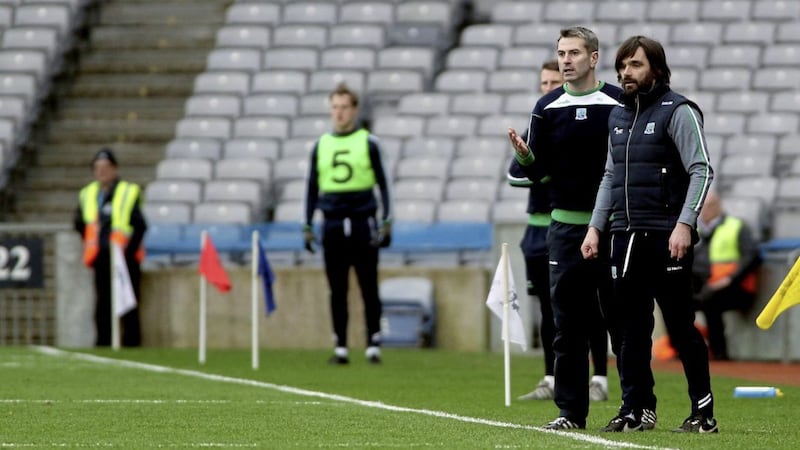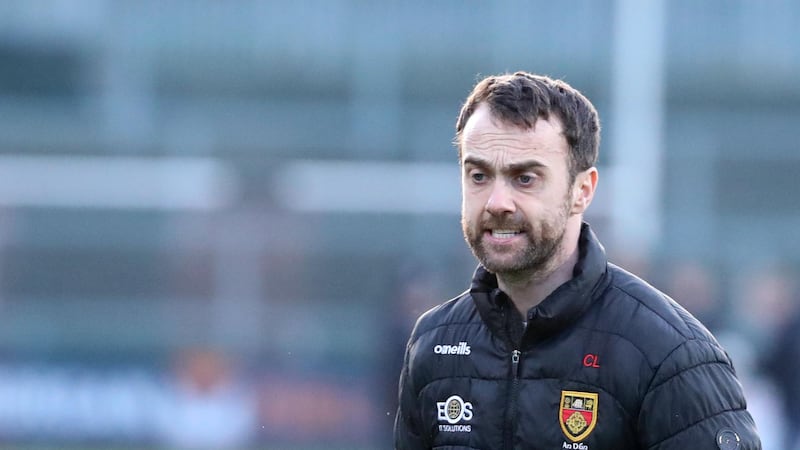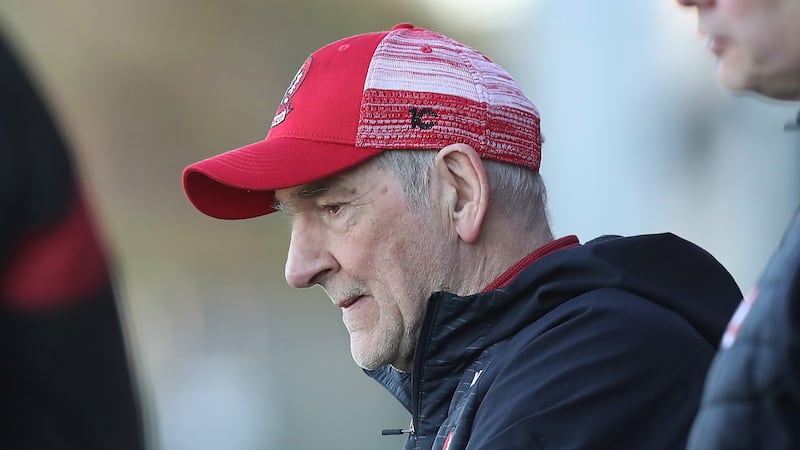“People and players would get sentimental about the idea of just reaching an Ulster final or playing in Croke Park. I never got caught up into that idea. I thought it would be great to win an Ulster final and win in Croke Park.”
Rory Gallagher in 2011
**
OF all the Ulster final mornings in Clones, this one felt different.
The old town was bathed by the sky’s finest blue and gold, and Fermanagh’s finest giddy green. They dominated every inch of grass, footpath and road they could find to stand on, getting high on its rarity.
Driving in from the Monaghan end, a cheer goes up that makes you fear you’d got the throw-in time wrong. Alas, it’s the greeting for a banner rolling up the hill with ‘Arlene’s Green and White Army’ emblazoned across it.
The whole thing had this grand historic air about it, as though this would finally be the day that they’d cast off Wicklow and become the 31st county on the provincial roll of honour.
But there was to be no fairytale. Within 15 minutes, Fermanagh’s limitations were laid bare. They were having to do the one thing they didn’t want to and chase the game.
When you’re built to survive, there’ll be days when the other side gets you in an armbar at the first bell.
Fermanagh are set up for games like their wins over Armagh and Monaghan. Games when they control the controllables, and half of the uncontrollables too. Days where they’d crawl across broken glass just to hang in the game long enough for that once chance to arrive.
Putting their return to the 2018 final in context before the game, Ryan McMenamin summed it up beautifully.
“Fermanagh's only got to six finals in 120 years – and I have been in six finals.”
A week later, they scored a season high of 0-18 against Kildare, but never came close to squeezing into the last eight.
In the aftermath, it was hard to see where they’d go next.
Their average of one Ulster final appearance every 20 years makes it hard to found optimism on anything too solid. On top of that, they’d been promoted to a very difficult-looking Division Two and over the winter, they lost Seamus Quigley and Tomás Corrigan (albeit the latter having fallen out of favour last year).
By Gallagher’s own admission last summer, this is a short-term project. There are no legion of minor teams coming behind to prop it up. If they get one or two half-decent players a year through, they’re doing well.
Due to their small playing pool, there are fewer than 300 men in their 20s that could play for Fermanagh. Some of the clubs that Rory Gallagher coached around when he lived in Dublin would almost have that pick.
“We looked at the whole thing and said these players weren’t interested in a three or four-year plan. It’s a five, six, seven month plan to get better,” said Gallagher last summer.
They maxed on one gym session a week and instead focussed on their skill level, their decision making and their tactical awareness.
The Fermanaghs of this world don’t build dynasties. If they’re lucky, once in a generation the pieces fall closely enough together to create a team capable of an odd big scalp.
The current team have those couple of top class players but largely, this is about maximising themselves.
Sitting joint-top of Division Two after four games, unbeaten and having just beaten two of last year’s Super 8 entrants, it’s safe to say they’re squeezing out their every drop.
"We played with a ferocious level, endeavour, hunger, heart and with a lot of quality in the second-half. Self-belief is earned. It's earned by battling on days like that,” said Gallagher after Sunday’s win in Letterkenny.
It was a magnificent win by any standards, but when you look at the losses of Corrigan and Quigley and then you load their best player, Eoin Donnelly, as well as key man-marker Mickey Jones and man of steel Barry Mulrone on top of their absentee list, it moves to a new plain.
The inferiority complex was never for their manager, as the quote at the top of this page underlines.
His methods are not always popular, as emphasised by how things finished out in Donegal.
The gameplan isn’t always transferable, and there is validity in the criticism that, particularly in his final year, they didn’t play the way that suited the players.
You can’t say the same about Fermanagh. Most counties with their resources have been slumming it around the bottom end of the league structure for decades on end.
There are those who’ll criticise their style as a matter of empty routine, but the most notable difference between Fermanagh and a lot of the teams beneath them is that the Ernemen have a clear plan in place that’s getting the most out of themselves.
Five down to Donegal on Sunday afternoon heading towards half-time, perhaps the last 40 minutes showed better than anything that they’re much better now than they were even ten months ago.
They outscored the Ulster champions 0-8 to 0-2 over the last 37 minutes. They did what they could never have done last summer and swung a game on its head.
Now they’ve Clare at home, an Armagh side that they also outfoxed last summer away and then Meath on the final day. Stepping into Division One for 2020 is now a realistic possibility.
Whatever you thought of the players’ move at the time, that level of progress over the last 18 months justifies their move to unseat Pete McGrath.
Things had gone stale and windows of opportunity don’t stay open for very long when your playing population is as small as theirs.
The players sensed they had more in themselves, and that something different was required to bring it out of them.
Rory Gallagher and Ryan McMenamin together have given them a structure, put a bit of steel back into them and sent them out into the world to use them to earn that self belief.
Results have followed. Players respond to nothing better than they respond to winning, and that’s clear every time they take the field now. They’re prepared to work like hounds, safe in the knowledge that this is their best way to win.
Whether they're able to do that in May and June will still depend on them doing everything right and making their opponents do a lot wrong.
But winning football is the only kind anyone wants to play.
For doing that, Fermanagh owe no apologies.









